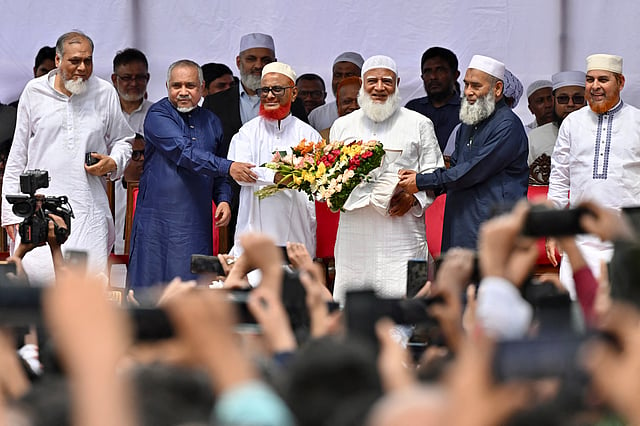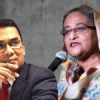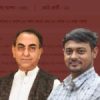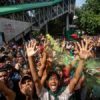
Jamaat-e-Islami is not simply another political party in Bangladesh; it is a living reminder of betrayal, bloodshed, and ideological treachery that almost strangled the nation at its birth. In 1971, when Bengalis rose for freedom, Jamaat did not just stand aside — it actively chose to become the political and ideological weapon of the Pakistan Army. Its leaders mobilized killers, legitimized genocide with religious rhetoric, and helped orchestrate some of the darkest crimes in modern history. A party that colluded in the massacre of its own people has no moral ground to claim relevance in independent Bangladesh. To call Jamaat “controversial” is too soft; it is a party whose very foundation is built on treason.
From its origins, Jamaat’s philosophy was never aligned with Bengali aspirations. Founded by Abul A’la Maududi in British India, the movement rejected ethnic or linguistic nationalism and insisted on an Islamic state where divine authority would stand above democratic will. When Bangladeshis demanded autonomy in the late 1960s through the Six-Point Plan, Jamaat opposed it bitterly, siding instead with the West Pakistani ruling class. They saw the independence movement not as a just struggle but as a “conspiracy against Islam.” This ideological blindness prepared the ground for their collaboration in 1971.
History remembers the names: Razakar, Al-Badr, Al-Shams. These were not abstract entities but militias created, supported, and directed with Jamaat’s blessing. They rounded up teachers, students, intellectuals, and anyone suspected of supporting independence. They raped women in the name of punishing “rebels.” They assassinated the brightest minds of Dhaka University days before victory, hoping to cripple the intellectual backbone of the new nation. Jamaat’s fingerprints are all over these atrocities. When the Pakistan Army committed genocide, Jamaat provided the local machinery to make it effective. No amount of revisionism or rhetorical gymnastics can wash this blood away.
And yet, after Liberation, Bangladesh made a fateful mistake. In the chaos of post-war politics, bans were imposed but later relaxed. By 1979, Jamaat re-entered the political system. Military rulers and opportunistic politicians allowed them back, not because Jamaat had changed, but because they wanted to exploit its organizational strength and loyal voter base. The BNP-Jamaat alliance in later decades elevated convicted war criminals to ministerial positions. This was not reconciliation; it was moral bankruptcy. The price of these compromises has been a poisoned democracy where enemies of independence were normalized for the sake of power.
Even when the International Crimes Tribunal finally brought justice decades later, the evidence was overwhelming. Leaders like Delwar Hossain Sayeedi, Motiur Rahman Nizami, and Abdul Quader Molla were convicted of crimes against humanity. Some were executed, others imprisoned. These were not political vendettas, as Jamaat claimed; they were legal reckonings with undeniable historical truths. The world saw the mass graves, the testimony of survivors, the archives of brutality. Jamaat’s leadership was found guilty not by rumor but by court, by evidence, by history itself. The fact that these criminals had once sat in parliament and held ministries is a stain on the conscience of Bangladesh’s political class.
Today, Jamaat pretends to have learned lessons. Its leaders issue carefully worded statements, hinting at “debates” about acknowledging past mistakes. They try to present themselves as defenders of democracy, calling for fair elections and constitutional reforms. But this rebranding is cosmetic. At its core, Jamaat has not renounced the ideology that led it to oppose independence. It has not issued an unconditional apology to the nation. It has not dissolved the student wing, Islami Chhatra Shibir, notorious for violence on campuses. Instead, it hopes that time and political fatigue will erase memory, allowing it to sneak back into mainstream politics under the guise of pluralism.
But pluralism does not mean giving space to traitors. Democracy is not obliged to host forces that reject its very principles. Jamaat’s constitution still places divine law above democratic sovereignty. That is fundamentally incompatible with the Republic of Bangladesh, which was born on the basis of people’s right to self-determination. A party that denies the supremacy of citizens’ will, that once justified genocide in the name of religion, cannot claim to be just another competitor in the electoral field.
The moral argument is simple: a nation founded through the blood of three million martyrs cannot coexist peacefully with the political heirs of those who collaborated in that bloodshed. Allowing Jamaat to operate freely is not inclusion — it is insult. It tells the families of 1971 victims that their suffering is negotiable, that the killers of their loved ones can return wearing new clothes and speaking smoother words. It tells the new generation that principles can be traded away for votes. That is not democracy; it is cynicism.
Jamaat’s defenders sometimes argue that banning them would push Islamist sentiment underground, leading to more radical movements. But this is a false choice. Bangladesh is a deeply religious country where faith coexists with secular nationalism. Islam does not need Jamaat to be represented in society. Millions of devout Muslims rejected Jamaat during the war and continue to reject it today. The risk of radicalization comes not from banning Jamaat but from letting it whitewash its history and recruit under false pretenses. By confronting Jamaat honestly, Bangladesh strengthens its democratic resilience.
What then should be done? The answer is neither complacency nor cosmetic inclusion. Jamaat should be permanently disqualified from electoral politics until it meets basic moral conditions: an unconditional public apology for its role in 1971, acceptance of the Liberation War as the legitimate birth of Bangladesh, dismantling of all paramilitary-style student and social wings, and rewriting of its constitution to affirm people’s sovereignty above all else. Anything less is a trick, a ploy to regain power without accountability.
The danger of allowing Jamaat back is not hypothetical. Look at Pakistan, where Jamaat-e-Islami remains a small but influential force, often legitimizing extremism in the name of faith. Look at how religious politics has polarized societies across South Asia. Bangladesh, which paid the highest price to free itself from Pakistan’s domination, cannot afford to replicate the same mistake by indulging Jamaat. The Liberation War was not just about geography; it was about values — dignity, democracy, and secular pluralism. To betray those values now is to betray the very essence of 1971.
Supporters of Jamaat like to claim that the party provides social services, charity, and community organization. But history teaches us that this “welfare” is often a recruitment tool, designed to build loyalty while promoting a rigid ideological agenda. Charity cannot absolve complicity in genocide. No amount of rice distribution can balance the ledger of 1971. A war crime is not forgiven by a bag of food or a free clinic. The moral calculus is much harsher: once you side with oppressors against your nation, your political legitimacy is destroyed forever.
Some will argue that Bangladesh should move forward, that dwelling on the past only keeps wounds open. But forgetting is not the same as healing. True healing comes from justice, acknowledgement, and repentance. Jamaat has offered none of these. Instead, it plays with language, avoids responsibility, and waits for political tides to shift. This is not the behavior of a repentant organization; it is the strategy of a cynical one. Moving forward cannot mean abandoning memory. Nations that forget their foundational sacrifices are doomed to repeat their mistakes.
Bangladesh is at a crossroads. On one side lies the temptation of expediency — to allow Jamaat back in exchange for electoral calculations or false notions of pluralism. On the other side lies the hard but necessary road of principle — to declare once and for all that those who betrayed the nation in its darkest hour have no place in shaping its future. The choice is moral, not tactical. And history will judge the leaders who make it.
Jamaat-e-Islami is not good for Bangladesh. It was not good in 1971, when it became the collaborator of genocide. It was not good in the decades after, when it spread violence on campuses and legitimized war criminals in government. And it is not good now, as it tries to re-enter politics without repentance. To embrace Jamaat is to spit on the graves of the martyrs, to mock the raped women who survived, to erase the intellectuals who were executed in cold blood. Bangladesh deserves better than to be haunted by the ghosts of its betrayers.
The verdict is clear Jamaat should not just be criticized, it should be condemned, isolated, and held accountable. Until it truly repents — not with words, but with actions — it remains a political cancer. And cancers are not negotiated with; they are removed for the survival of the body. For Bangladesh, removing Jamaat from its political bloodstream is not extremism — it is self-preservation.






আপনার মতামত জানানঃ